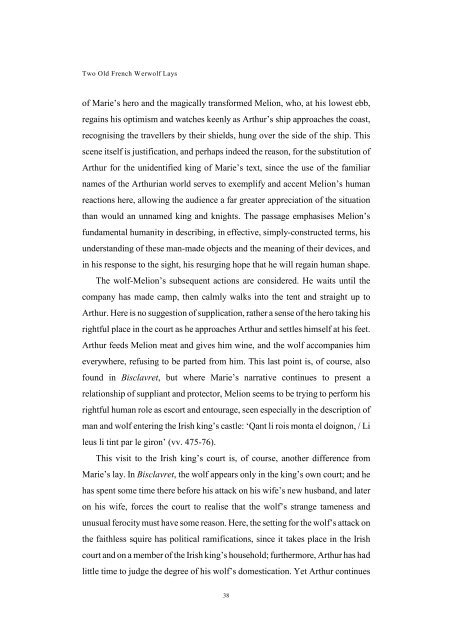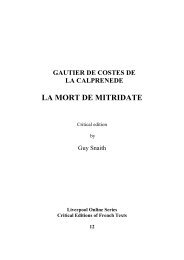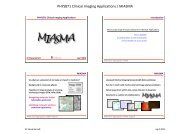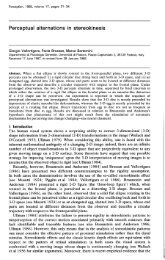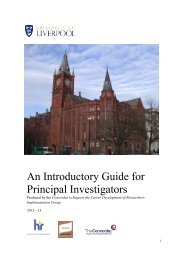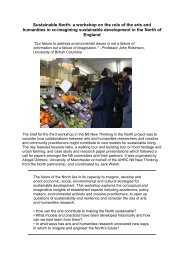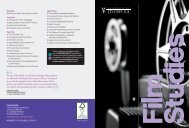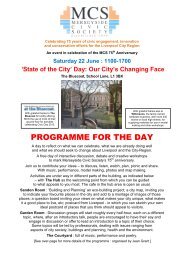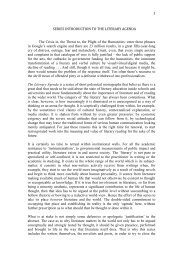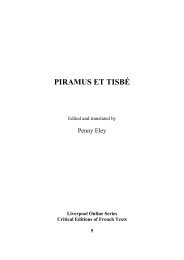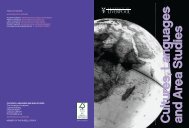Melion and Biclarel - University of Liverpool
Melion and Biclarel - University of Liverpool
Melion and Biclarel - University of Liverpool
You also want an ePaper? Increase the reach of your titles
YUMPU automatically turns print PDFs into web optimized ePapers that Google loves.
Two Old French Werwolf Lays<br />
<strong>of</strong> Marie’s hero <strong>and</strong> the magically transformed <strong>Melion</strong>, who, at his lowest ebb,<br />
regains his optimism <strong>and</strong> watches keenly as Arthur’s ship approaches the coast,<br />
recognising the travellers by their shields, hung over the side <strong>of</strong> the ship. This<br />
scene itself is justification, <strong>and</strong> perhaps indeed the reason, for the substitution <strong>of</strong><br />
Arthur for the unidentified king <strong>of</strong> Marie’s text, since the use <strong>of</strong> the familiar<br />
names <strong>of</strong> the Arthurian world serves to exemplify <strong>and</strong> accent <strong>Melion</strong>’s human<br />
reactions here, allowing the audience a far greater appreciation <strong>of</strong> the situation<br />
than would an unnamed king <strong>and</strong> knights. The passage emphasises <strong>Melion</strong>’s<br />
fundamental humanity in describing, in effective, simply-constructed terms, his<br />
underst<strong>and</strong>ing <strong>of</strong> these man-made objects <strong>and</strong> the meaning <strong>of</strong> their devices, <strong>and</strong><br />
in his response to the sight, his resurging hope that he will regain human shape.<br />
The wolf-<strong>Melion</strong>’s subsequent actions are considered. He waits until the<br />
company has made camp, then calmly walks into the tent <strong>and</strong> straight up to<br />
Arthur. Here is no suggestion <strong>of</strong> supplication, rather a sense <strong>of</strong> the hero taking his<br />
rightful place in the court as he approaches Arthur <strong>and</strong> settles himself at his feet.<br />
Arthur feeds <strong>Melion</strong> meat <strong>and</strong> gives him wine, <strong>and</strong> the wolf accompanies him<br />
everywhere, refusing to be parted from him. This last point is, <strong>of</strong> course, also<br />
found in Bisclavret, but where Marie’s narrative continues to present a<br />
relationship <strong>of</strong> suppliant <strong>and</strong> protector, <strong>Melion</strong> seems to be trying to perform his<br />
rightful human role as escort <strong>and</strong> entourage, seen especially in the description <strong>of</strong><br />
man <strong>and</strong> wolf entering the Irish king’s castle: ‘Qant li rois monta el doignon, / Li<br />
leus li tint par le giron’ (vv. 475-76).<br />
This visit to the Irish king’s court is, <strong>of</strong> course, another difference from<br />
Marie’s lay. In Bisclavret, the wolf appears only in the king’s own court; <strong>and</strong> he<br />
has spent some time there before his attack on his wife’s new husb<strong>and</strong>, <strong>and</strong> later<br />
on his wife, forces the court to realise that the wolf’s strange tameness <strong>and</strong><br />
unusual ferocity must have some reason. Here, the setting for the wolf’s attack on<br />
the faithless squire has political ramifications, since it takes place in the Irish<br />
court <strong>and</strong> on a member <strong>of</strong> the Irish king’s household; furthermore, Arthur has had<br />
little time to judge the degree <strong>of</strong> his wolf’s domestication. Yet Arthur continues<br />
38


